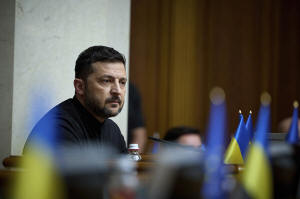Zelenskyy moves to restore independence of Ukraine anti-graft agencies
after protests, EU criticism
[July 25, 2025]
By ILLIA NOVIKOV and HANNA ARHIROVA
KYIV, Ukraine (AP) — President Volodymyr Zelenskyy on Thursday submitted
a new bill that would restore the independence of Ukraine's
anti-corruption agencies in an effort to defuse tensions following his
approval earlier this week of a controversial law that weakened their
autonomy.
The previous bill was seen as undermining the agencies' independence and
sparked a public outcry and protests, the first major demonstrations
since the war began, as well as sharp criticism from the European Union.
Zelenskyy said parliament would review the new bill, which "guarantees
real strengthening of Ukraine’s law enforcement system, the independence
of anti-corruption bodies, and reliable protection of the legal system
from any Russian interference.”
First reactions
Ukraine's two main anti-graft agencies — the National Anti-Corruption
Bureau of Ukraine and the Specialized Anti-Corruption Prosecutor’s
Office — quickly welcomed Zelenskyy's new proposal, saying it restores
all their procedural powers and guarantees their independence.
The agencies said they helped draft the new bill, and urged lawmakers to
adopt it “as soon as possible” to prevent threats to ongoing criminal
cases.
The bill would replace the contentious law passed by lawmakers and
approved by Zelenskyy earlier this week. Critics said it stripped
Ukraine’s anti-corruption agencies of their independence by granting the
government more oversight of their work.

A controversial law
Zelenskyy initially argued the law was needed to speed up
investigations, ensure more convictions and remove Russian meddling.
After Thursday's U-turn, Zelenskyy said the new bill reverses the
earlier changes and also introduced additional measures aimed at
“combating Russian influence,” including mandatory polygraph tests for
law enforcement officers.
“The text is balanced," Zelenskyy said. “The most important thing is
real tools, no Russian ties and the independence” of the anti-graft
agencies.
The new draft underlines that the prosecutor general and his deputies
cannot give orders to anti-graft agencies or interfere in their work.
Bowing to pressure and protests
The controversy surrounding the initial bill has threatened to undermine
public trust in Ukraine's leadership after more than three years of
fighting Russia's full-scale invasion. The protests haven’t called for
Zelenskyy’s ouster, but they are the first major anti-government
demonstrations since the war started in February 2022.
“It is important that we maintain unity,” Zelenskyy said in his post.
It was not immediately clear when the new bill will be voted on in the
parliament, and the protests are likely to continue until the law is
passed. At the protests on Thursday evening, the crowd was smaller than
on previous days.
The unrest has come at a difficult time in the all-out war. Russia’s
bigger army is accelerating its efforts to pierce Ukraine’s front-line
defenses and is escalating its bombardment of Ukrainian cities.
[to top of second column]
|

President of Ukraine Volodymyr Zelenskyy attends the parliament
session in Kyiv, Ukraine Thursday, July 17, 2025. (AP Photo/Vadym
Sarakhan)

The bigger picture
Ukraine is also facing a question mark over whether the United
States will provide more military aid and whether European
commitments can take up the slack, with no end in sight to the war.
Delegations from Russia and Ukraine met in Istanbul for a third
round of talks in as many months Wednesday. But once again, the
talks were brief and delivered no major breakthrough.
Fighting entrenched corruption is crucial for Ukraine’s aspirations
to join the EU and maintain access to billions of dollars in Western
aid in the war. It is also an effort that enjoys broad public
support.
EU Enlargement Commissioner Marta Kos expressed concern Wednesday
over the law approved earlier this week, calling it “a serious step
back.”
The Ukrainian branch of Transparency International criticized
parliament’s decision, saying it undermines one of the most
significant reforms since what Ukraine calls its Revolution of
Dignity in 2014 and damages trust with international partners.
Deadly fighting grinds on
On Thursday, two women, aged 48 and 59, were killed and 14 other
people were injured when Russian forces dropped four powerful glide
bombs on Kostiantynivka, an industrial city in eastern Ukraine, and
shelled it with artillery, Donetsk regional Gov. Vadym Filashkin
said.
Russian planes also dropped two glide bombs on the center of Kharkiv,
Ukraine’s second-largest city, on Thursday morning, regional Gov.
Oleh Syniehubov said. At least 42 people were wounded, including two
babies, a 10-year-old girl and two 17 year olds, authorities said.
The southern city of Odesa, and Cherkasy in central Ukraine, were
also hit overnight, authorities said. The drone and missile strikes
on the cities wounded 11 people, including a 9-year-old, and damaged
historic landmarks and residential buildings, officials said.
Ukraine has sought to step up its own long-range drone attacks on
Russia, using domestic technology and manufacturing.
An overnight Ukrainian drone attack on the Russian Black Sea resort
of Sochi killed two women and wounded 11 other people, local
authorities said Thursday.
An oil depot was hit, officials said, without offering details.
All contents © copyright 2025 Associated Press. All rights reserved
 |